|
|
|
Sort Order |
|
|
|
Items / Page
|
|
|
|
|
|
|
| Srl | Item |
| 1 |
ID:
152414
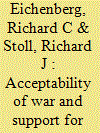

|
|
|
|
|
| Summary/Abstract |
We study the factors that influence citizen support for defense spending in fourteen democracies over the period 2004–2013. We pose two research questions. First, what factors influence citizen support for war and military force? We refer to this as the acceptability of war. Second, in addition to the acceptability of war, what other factors affect support for defense spending? Our principal finding is that citizen acceptance of war and support for defense spending are most influenced by basic beliefs and values. Gender also has a strong negative influence on attitudes toward war and thus indirectly lowers support for defense spending among women. Attitudes toward war and defense spending are also sometimes influenced by short-term threats and by alliance considerations, but the effects are not as substantively meaningful. We conclude with a summary of the results and a discussion of the implications for theory and policy.
|
|
|
|
|
|
|
|
|
|
|
|
|
|
|
|
| 2 |
ID:
079920
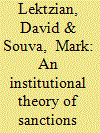

|
|
|
|
|
| Publication |
2007.
|
| Summary/Abstract |
Why do economic sanctions sometimes succeed, but often fail, to produce a policy change? The authors argue that the effect of economic punishment is conditional on a state's political institutions. In all cases, the key to sanctions success is to generate political costs for the target regime's winning coalition. However, because of different institutional incentives, economically punishing sanctions are less likely to succeed against a nondemocratic target than against a democratic target. Sanctions increase rents. This benefits nondemocratic leaders more than democratic ones. Also, nondemocratic leaders have smaller winning coalitions, so their core constituents suffer less from sanctions than democratic leaders. Additionally, the authors' strategic argument leads to novel hypotheses regarding the initiation of sanctions. They test hypotheses from their political cost argument against all dyadic sanctions cases between 1948 and 1990, using two different dependent variables and a censored selection estimator to take into account the strategic nature of sanctioning
|
|
|
|
|
|
|
|
|
|
|
|
|
|
|
|
| 3 |
ID:
118939
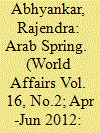

|
|
|
| 4 |
ID:
173998
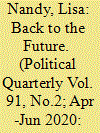

|
|
|
|
|
| Summary/Abstract |
Growing divisions between Britain’s towns and cities have created a dilemma for the Labour Party in seeking to represent very different parts of the country. There are some who argue that Labour must choose the global networked youth—who largely reside in cities—in order to maximise its electoral chances. This is an argument that defies electoral gravity and fails to address the root causes of the gulf between towns and cities. As jobs and investment have gone into cities, many towns have seen the local population age and local economies become unsustainable. In both towns and cities there is a clamour for power to move closer to home and for the renewal of democratic institutions, offering Labour the chance to win power and end the divisions that have come to characterise British politics.
|
|
|
|
|
|
|
|
|
|
|
|
|
|
|
|
| 5 |
ID:
163467
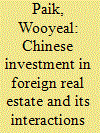

|
|
|
|
|
| Summary/Abstract |
Since the early 2000s, a great tide of Chinese "go outside" (zouchuqu), or outbound foreign investment, has happened in many regions and industries of the world. Among these, real estate has emerged as one of the most rapidly increasing outbound investments from China in the 2010s. As a result, Chinese investors, both enterprises and individuals, have had an extensive and growing impact on host states and societies, which are largely developed and democratic. This study analyzes the multifaceted interactions between Chinese foreign real-estate investors and host states and societies using the case of Jeju Province in South Korea from 2010 to 2018. More specifically, it analyzes the responses of the host country's national and local governments, as well as its grassroots civil society, to the soaring and often unconstrained Chinese investment in its real estate, focusing on the role of a host country's democratic institutions.
|
|
|
|
|
|
|
|
|
|
|
|
|
|
|
|
| 6 |
ID:
173765
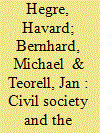

|
|
|
|
|
| Summary/Abstract |
We theorize that three distinct structures of democratic constraint explain why more democratic dyads do not engage in military conflict with each other. We build on earlier theories that focused on electoral and horizontal accountability. We add a new dimension—the social accountability provided by an active civil society. Using several new measures from the Varieties of Democracy (V-Dem) data set, we stringently test these explanations. We find social accountability to be the strongest and most consistent predictor of nonbelligerence in dyads, that horizontal accountability is still important, but that the independent role of electoral accountability has been somewhat overstated. However, we do find that social and electoral accountability work strongly together, to make for an even greater effect. The finding is robust to a range of specifications and in the face of controls for contending theories that challenge the democratic peace (e.g., the capitalist and territorial peace theories).
|
|
|
|
|
|
|
|
|
|
|
|
|
|
|
|
| 7 |
ID:
097918
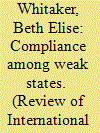

|
|
|
|
|
| Publication |
2010.
|
| Summary/Abstract |
This article examines levels of compliance with the counter-terrorism regime in Africa, where weak states might have been expected to conform. Instead, even under American pressure, some governments have seized the anti-terrorism rhetoric while others have been more reluctant. A comparative analysis of Kenya, Tanzania, and Uganda demonstrates that domestic political factors largely explain this variation; compliance is highest in countries with the least democratic institutions and minimal mobilisation of domestic constituencies. Aid dependence and the perception of a terrorist threat also play a role. To the extent that popular pressures in transitional democracies reduce compliance, the article raises questions about the legitimacy and effectiveness of the counter-terrorism regime.
|
|
|
|
|
|
|
|
|
|
|
|
|
|
|
|
| 8 |
ID:
164161
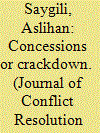

|
|
|
|
|
| Summary/Abstract |
A prominent view in the terrorism literature is that democracies make soft targets for terrorists due to their citizenry’s low tolerance for civilian casualties. This study tests this claim in the context of hostage taking terrorism, which is a unique form of violence that coerces the target state into negotiating over its citizens’ lives under public scrutiny. I argue that democratic accountability generates softer responses to hostage crises only in mature democracies, where leaders’ concern over being held accountable for the human costs of a no-concessions policy outweighs the reputational costs of conceding to terrorists’ demands. Using data on government responses to hostage incidents from 1978 to 2005, I find that regime type becomes a significant predictor of target concessions only at higher levels of regime stability. To test the accountability mechanism proposed by theory, I examine the effect of electoral cycles on target response; as expected, while nearing elections soften democratic responses to hostage crises, in general their positive effect on the likelihood of concessions is stronger in consolidated democracies.
|
|
|
|
|
|
|
|
|
|
|
|
|
|
|
|
| 9 |
ID:
073762
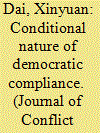

|
|
|
|
|
| Publication |
2006.
|
| Summary/Abstract |
Do democratic institutions enhance a country's compliance with international commitments? The author develops a game-theoretic model that highlights the conditional nature of democratic institutions' effect on compliance. Rather than assuming that the electorate in a democracy benefits from compliance uniformly, the author considers domestic distributional consequences of compliance. The model thus incorporates the preferences of competing domestic constituents as well as their politically relevant attributes such as electoral leverage and informational advantage. The model shows that, although electoral institutions intensify politicians' accountability to domestic constituents, the direction of this electoral effect on compliance is determined by the political attributes of competing interests. The author illustrates this theory with examples of international economic and environmental policies.
|
|
|
|
|
|
|
|
|
|
|
|
|
|
|
|
| 10 |
ID:
152415
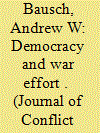

|
|
|
|
|
| Summary/Abstract |
This article uses a laboratory experiment to explore how groups’ internal rules for leader selection affect how leaders select into and fight conflicts. The findings reveal that, counter to expectations, leaders of democratic groups were more likely than leaders of autocratic groups to select into a conflict rather than accept a negotiated settlement. Conditional on conflict occurring, democratic leaders did not mobilize more resources for war than autocratic leaders. However, democratic leaders were less likely to accept a settlement once a war was underway and they expended more effort in the last round of conflict, suggesting once they entered a war they fought for a decisive victory. Domestically, democratic leaders were punished for losing wars more often than autocratic leaders, while winning wars did not benefit democratic leaders significantly.
|
|
|
|
|
|
|
|
|
|
|
|
|
|
|
|
| 11 |
ID:
152420
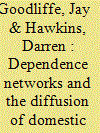

|
|
|
|
|
| Summary/Abstract |
How and to what extent do states influence the level of democracy and autocracy in other states? We argue that states exist internationally in dependence networks with each other and that those networks provide pathways for influence on a state’s domestic institutions. For any given state, a dependence network is a set of partner states with whom it regularly engages in exchanges of valued goods, where those exchanges would be costly to break. We find that an index of three such networks–trade, security and shared international organization membership–significantly influences the domestic political institutions in a given state. These changes are substantively large in the long run, similar in size to regional and global levels of democracy. State capabilities figure heavily in our network measures, thus emphasizing the role of power in the diffusion of domestic political institutions. We also find that network-influenced change works both ways: states can become more autocratic or more democratic.
|
|
|
|
|
|
|
|
|
|
|
|
|
|
|
|
| 12 |
ID:
180670
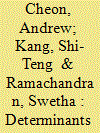

|
|
|
|
|
| Summary/Abstract |
When do indigenous and other negatively affected populations mobilize against fossil fuel companies? We revisit social movement theory and environmental literature to identify three factors that may plausibly shape mobilization decisions of negatively affected populations—democratic institutions, community perceptions of government shaped by land tenure security, and firm attributes. Democratic institutions afford more opportunities for affected populations to air their grievances through protests than non-democratic ones. Land tenure security guaranteed by government contributes to the perception among affected populations that their objectives are better achieved through government mediation than protests. Characteristics of fossil fuel firms, such as state ownership, also shape activist perceptions of government credibility as a mediator. By analyzing fifty-seven countries over the period 1990 to 2013, we find that democracy and state ownership of fossil fuel firms are positively associated with protests, whereas land tenure security is negatively associated.
|
|
|
|
|
|
|
|
|
|
|
|
|
|
|
|
| 13 |
ID:
095316
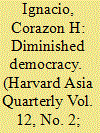

|
|
|
|
|
| Publication |
2009.
|
| Summary/Abstract |
There have been countless assaults to the democracy and democratic institutions that the Philippines has been enjoying over the past 111 years.What has saved the country is the innate attributes of its people.peace loving, resilient, forbearing, and religious. The dark practices of electoral politics and the dirty tentacles of politicians are the latest threats to the country's democracy. Will democracy continue to hold given the erosive and continuous assault on its electoral system, as the country prepares for a national election in May 2010?
|
|
|
|
|
|
|
|
|
|
|
|
|
|
|
|
| 14 |
ID:
160789
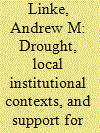

|
|
|
|
|
| Summary/Abstract |
We address two questions on the effects of climate change for social instability. First, do droughts and their associated environmental impacts affect support for the use of violence? Second, do local-level formal and informal institutions moderate support for violence when and where droughts worsen? To answer these questions, we conducted a national survey of 1,400 Kenyans in 2014. Respondents were asked about patterns of rainfall and the presence of rules regulating natural resource use and access. Survey data are joined to spatially disaggregated observed rainfall trends. The survey uses endorsement experiments to elicit honest responses about support for using violence. There is some evidence of a direct, though limited, link between observed drought and violent attitudes. Certain local-level natural resource use rules have moderating effects on support for violence where drought is reported and precipitation is less frequent. This conditional and contextual effect is an important modification of overly simplistic narratives of universal climate change effects.
|
|
|
|
|
|
|
|
|
|
|
|
|
|
|
|
| 15 |
ID:
193120
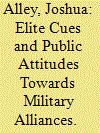

|
|
|
|
|
| Summary/Abstract |
Do elite cues exert extensive, conditional or minimal influence on public support for military alliances in the United States? I assess the boundaries of elite leadership on public opinion towards alliances by dividing partisan respondents into wings based on isolationism and militant assertiveness. If co-partisan elite cues change public attitudes across three or four wings within their party, elites exert extensive influence. Elite cues exert conditional influence if they reach two party wings, and minimal influence if they impact one or no wings. Using two conjoint survey experiments to examine public attitudes towards forming and maintaining international alliances, I find that elite cues exert extensive influence, but some individuals hold rigid alliance attitudes. Staunch alliance supporters in the Democratic party and consistent alliance skeptics in the Republican party both discount elite cues. Therefore, elites can lead most party wings with alliance cues, but intra-party divisions can constrain their influence.
|
|
|
|
|
|
|
|
|
|
|
|
|
|
|
|
| 16 |
ID:
164167
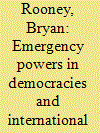

|
|
|
|
|
| Summary/Abstract |
Scholars argue that institutions in democracies constrain leaders and prevent international conflict. However, many democracies specify rules of governance in times of emergency that divert substantial power to the head of state. The manipulation of these “emergency powers” provides a rational motivation for conflict. Using a novel data set of emergency provisions within democracies, I test the relationship between emergency power strength and conflict propensity using several steps to achieve causal inference, including an instrumental variable analysis that exploits the specificity of the state’s constitution as a plausibly exogenous determinant of emergency power strength. I find that emergency power strength is a strong predictor of conflict onset in democracies in each test and that states with strong emergency powers are substantially more likely to enact a state of emergency due to an international conflict. I conclude with a discussion of my findings and avenues of future research using these data.
|
|
|
|
|
|
|
|
|
|
|
|
|
|
|
|
| 17 |
ID:
100864
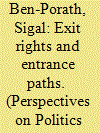

|
|
|
|
|
| Publication |
2010.
|
| Summary/Abstract |
The debate over the accommodation of culture in liberal democracies tends to emphasize exit rights. Autonomy is typically taken as a pre-condition for exit, and public schools are often charged with promoting or facilitating it. I argue that diversity liberals have a more justifiable view than that of autonomy liberals on cultural accommodation, but diversity liberalism too should reframe its view of exit rights. Narrow exit rights that protect basic human rights should be maintained and augmented with entrance paths into general society. I further suggest that for exit rights along with entrance paths to provide the morally required conditions for accommodating culture while respecting freedom, policies in this realm should be designed to address adults rather than children. I consider the effect of this dual change of perspective on the accommodation of culture in democratic institutions, including schools.
|
|
|
|
|
|
|
|
|
|
|
|
|
|
|
|
| 18 |
ID:
189013
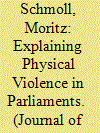

|
|
|
|
|
| Summary/Abstract |
Why do lawmakers resort to physical violence in some parliaments but not in others? Brawls not only constitute a stark break with democratic norms and ideals, they also affect voter perceptions and have been seen as a bellwether for conflict and democratic backsliding. Yet, the phenomenon remains poorly understood. This paper introduces a new, original dataset recording reported incidents of physical fights in parliaments across the globe between 1980 and 2018 that includes almost four times more cases of violence than existing data. Theoretically, we argue that levels of democracy and the composition of parliament should drive violence. The analysis shows that fighting is most common in countries that are neither very autocratic nor very democratic, in fragmented parliaments, and in chambers with slim majorities. The findings have implications for the study of (de-)democratization, political instability, and the design of democratic institutions.
|
|
|
|
|
|
|
|
|
|
|
|
|
|
|
|
| 19 |
ID:
175337
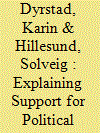

|
|
|
|
|
| Summary/Abstract |
What explains support for violence against the state? The surge in survey-based studies in (former) conflict areas has improved our understanding of the determinants of armed conflict. Yet, the potential interaction between grievances and political opportunity structure has received little attention in microlevel studies. Integrating common arguments from the civil war literature with the political behavior tradition, this article argues that perceived political efficacy, a central component of the political opportunity structure, moderates the association between individual and group grievance and people’s support for political violence. It represents a first individual-level test of the argument that perceived political opportunity structure and grievances combine to explain internal armed conflict. Using original survey data from Guatemala, Nepal, and Northern Ireland (2016), we find robust empirical evidence that support for violence increases with perceived grievance and decreases with political efficacy; and some evidence of an interaction between the two.
|
|
|
|
|
|
|
|
|
|
|
|
|
|
|
|
| 20 |
ID:
164170
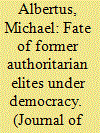

|
|
|
|
|
| Summary/Abstract |
Why do some former authoritarian elites return to power after democratization through reelection or reappointment to political office, or by assuming board positions in state-owned or major private enterprises, whereas others do not and still others face punishment? This article investigates this question using an original data set on constitutional origins and the fate of the upper echelon of outgoing authoritarian elites across Latin America from 1900 to 2015. I find that authoritarian elites from outgoing regimes that impose a holdover constitution that sticks through democratization are more likely to regain political or economic power—especially through national positions where the potential payoffs are largest—and less likely to face severe or nominal punishment. I also find a positive role for political capital among former elites. These results are robust to alternative explanations of authoritarian elites’ fate and using instrumental variables to address potential endogeneity. The findings have important implications for democratic consolidation and quality.
|
|
|
|
|
|
|
|
|
|
|
|
|
|
|
|
|
|
|
|
|